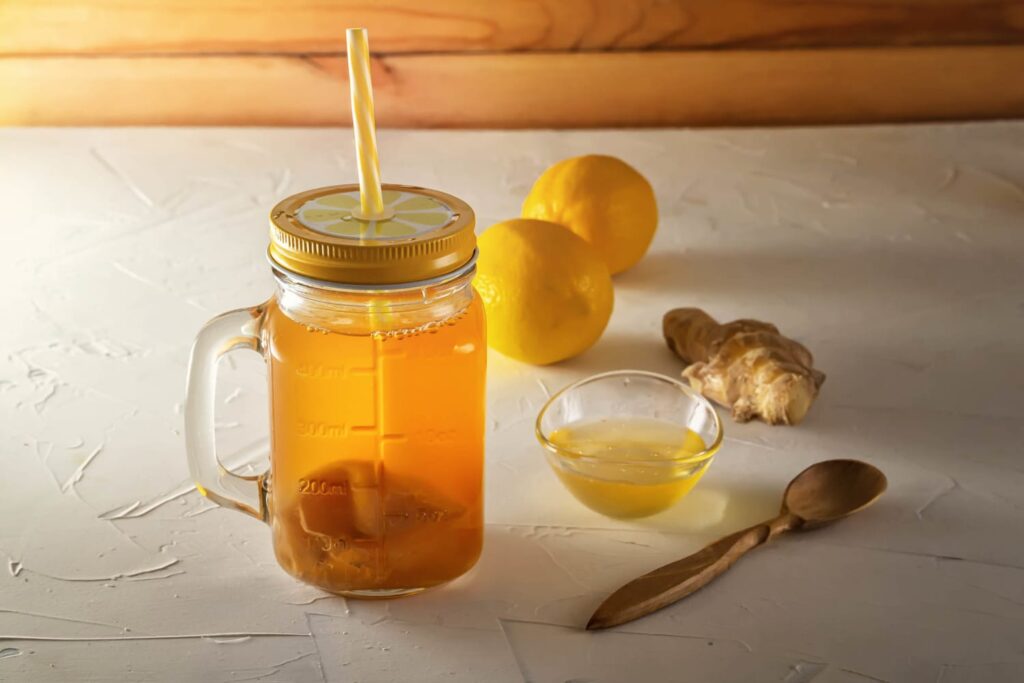Kombucha, the carbonated fermented tea drink, continues to grow in popularity. But is it actually good for you? Maybe it is, but read the label carefully before downing the entire bottle, say nutritionists.
Kombucha contains probiotics, or healthy gut bacteria, but it's not entirely clear whether it actually helps, says Natalie Rizzo, R.D., nutrition editor at TODAY.com.
Added sugar is also something to consider, Rizzo said: Kombucha needs to contain sugar to facilitate fermentation, and some brands add more than others.
Still, kombucha can be a delicious drink that provides all of the antioxidants and health benefits of tea, Rizzo adds, and it can be a great alternative to soda. But before you start drinking kombucha every day, experts want you to know:
What is Kombucha?
Kombucha is a fermented tea drink.
Rizzo says the tea is typically made with tea, a bacterial and yeast culture called a “SCOBY,” and sugar to feed the bacteria and yeast. The addition of the bacteria and yeast causes fermentation, which gives the tea its probiotic benefits.
Some people make kombucha at home, which is done using a jellyfish-like scoby. To make your own kombucha, you need to be very careful about keeping everything sterile. The process involves brewing tea and adding sugar, then adding bacteria and yeast. The bacteria and yeast feed on the sugar and start the fermentation process.
This entire process gives the kombucha a slightly effervescent, sweet and sour flavor.
The probiotic benefits of kombucha
Kombucha contains probiotics, a source of “good” bacteria that help improve gastrointestinal function. Truly fermented foods promote gut health, which in turn boosts immunity, benefits mental health, and reduces chronic inflammation.
That said, the benefits of kombucha-derived probiotics aren't particularly well established, Rizzo explains: Most probiotic studies involve isolating specific strains of beneficial bacteria and looking at how those strains affect symptoms of, say, irritable bowel syndrome.
“But with a food product like kombucha, you don't always know exactly what strains are in it or how many cultures are in it, so it's hard to say for sure whether the product will help with a specific health issue,” Rizzo said.
Still, kombucha “is generally good for you because it increases the good bacteria in your gut microbiome,” Rizzo said, “but there's not a ton of research on it.”
Other Health Benefits of Kombucha
In addition to being rich in probiotics, kombucha also contains antioxidants that provide a variety of health benefits.
Kombucha is made from tea and may offer a number of health benefits, including heart health and blood sugar control. “Tea in general is good for you, so it's a good idea to include it in your diet,” Rizzo says.
Nutritionists previously told TODAY.com that kombucha is a good low-sugar alternative to carbonated drinks, with a slightly sweet taste and natural caffeine. Plus, unlike kefir (another fermented drink), kombucha is dairy-free, making it a good option for vegans and those who are lactose intolerant.
Alcohol in Kombucha
Keep in mind that the fermentation process produces very small amounts of alcohol in your kombucha.
Most brands have an alcohol content of around 0.5 percent, the same amount as non-alcoholic beer, Rizzo says, but the exact amount of alcohol in a bottle of kombucha varies from brand to brand, so it's wise to check the label, especially if you're pregnant or avoiding alcohol for any reason.
Beware of added sugars
When purchasing kombucha, check the bottle to see how much sugar has been added.
The kombucha brewing process requires the addition of a small amount of sugar, but no more than 5 grams per serving.
Recommendation
Keep in mind that the American Heart Association recommends limiting added sugar intake to 25 grams per day for women and 36 grams per day for men. Keep in mind that added sugar “shows up in a lot of different places,” like bread and yogurt, so it's a good idea to watch how much you're getting from kombucha, Rizzo says.
If you buy kombucha instead of making it yourself, make sure to choose one with a simple ingredients list that includes the tea, a sugar source, and a mention of “live cultures.” The only other ingredients on the list should be healthy whole-food additives like ginger, turmeric, and lemon juice.
You should also make sure that the brand you're drinking from doesn't pasteurize their bottles. Like many nutrients, the probiotics in kombucha cannot survive pasteurization, so you should drink it unpasteurized.
There are many great brands out there brewing high-quality, delicious, gut-healthy kombucha, but as the market expands, some brands are taking shortcuts, like adding probiotics at the end instead of brewing real kombucha, or adding loads of unnecessary sugar for flavor.
The key, as always, is to carefully check the nutritional label before purchasing.
Is it okay to drink kombucha every day?
Yes, you can, but Rizzo says it's best to watch your portion sizes: Some companies count one jar as two servings, so read the label carefully, especially to limit added sugars.
In general, if you drink kombucha daily, Rizzo recommends limiting yourself to 4 ounces per day due to the added sugar.



